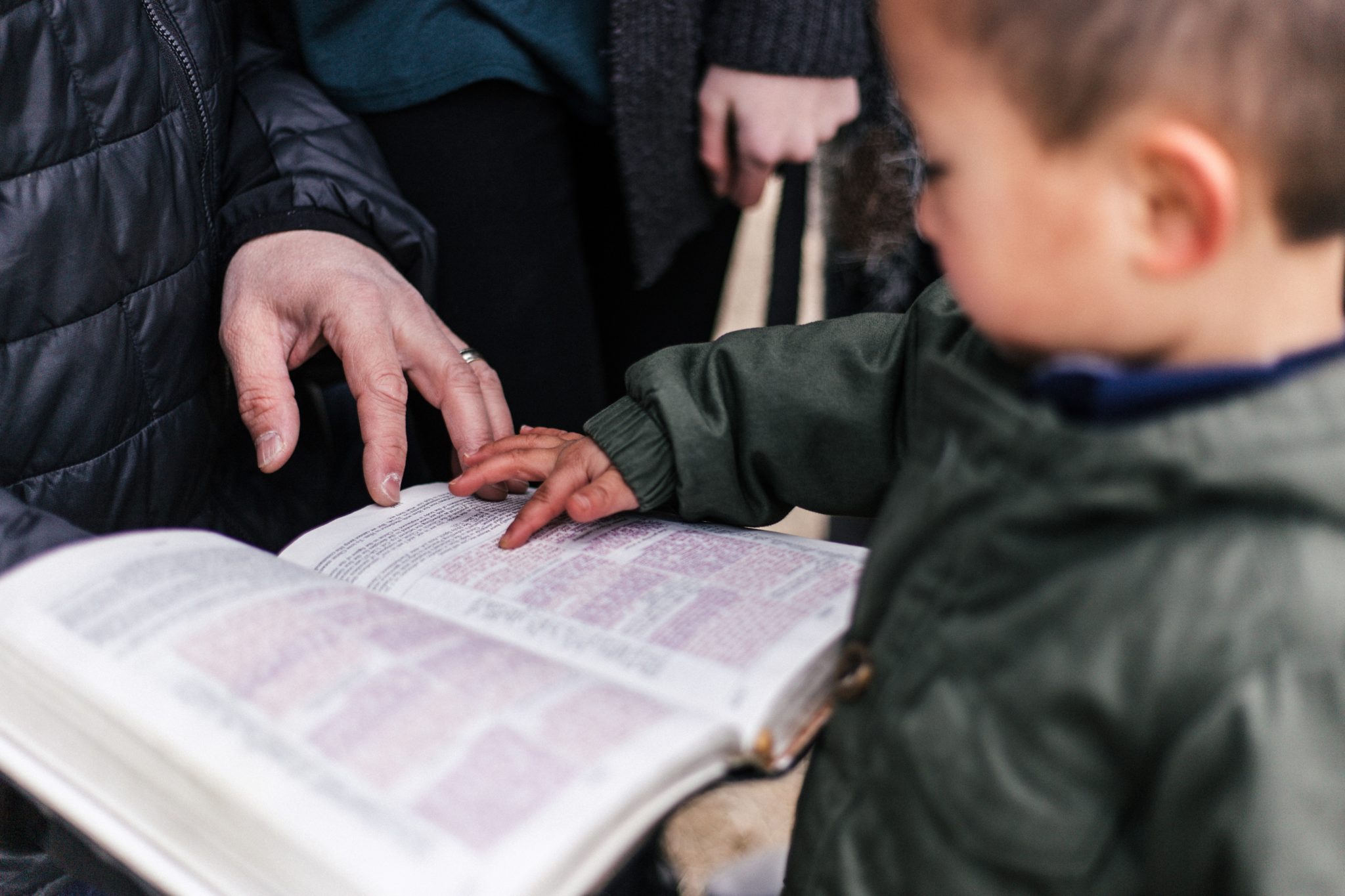I f faith is like a string of pearls, with Bible lessons and personal testimonies of God’s love handed down from one generation to another, the necklace is at great risk of breaking. The stress point is today’s generation of millennial parents with young children. As millennials, we may have our own conflicts with the church—we may not even be in the church—but this Christian faith is too precious a gift to let the chain break. It is imperative that this faith be handed down to our little ones so they, too, may know, love, and serve God and their neighbor.
A recent Barna Group study revealed that 51 percent of parents believe that the faith formation of their child(ren) is not their responsibility. Instead, they feel unqualified as spiritual leaders and believe that responsibility falls to the church, specifically children’s ministry leaders. And while the church is responsible for helping its members—and new disciples—better love and serve God, faith formation in the youngest disciples is really meant to be established in the family and supported by the church community. It’s a biblical model, and we want to offer a few ideas for helping young parents accomplish this important task.
From generation to generation… What does the Bible say?
It’s not a startling statistic that drives us to own our faith and pass it on to our children. It’s a biblical model and, more than that, the salvation of our children is on the line. Let’s look at what the central text of our faith, the Bible, says about parents’ responsibility of faith formation in their children.
Carry on the legacy
Right at the beginning of the Bible, in Genesis 15, there’s a beautiful story of Abraham’s legacy of faith. Abraham (still called Abram at this time) is promised by God that he will have as many children as the stars in the sky, if he can count them. But Abram’s concern is not that he will have a bunch of joyful children to make his life richer; his concern is much greater! The legacy of a leader during his time was passed on through generations. If Abram couldn’t produce an heir, his legacy, including all of his possessions and family stories, would die with him and his wife, Sarai. Yet Abraham’s faith is known to this day, generations and generations later.
The big why behind our work with Next Generation Engagement—creating intergenerational relationships so all people can help steward in the kingdom of God—is that people are leaving their faith behind. Our aim is to sustain faith, for the present and future church. That means tending to our own faith and nurturing faith in our children, so that neither generation throws away this beautiful legacy of faith from our ancestors.
In Hebrews 11, what is often called “the faith chapter,” we read the examples of Abel, Enoch, and Noah, the acts of faith of Abraham and Moses, and the heroic deeds of other Israelites, like Rahab, David, and the early martyrs. It’s a beautiful testimony to the faith of our biblical ancestors. In our own modern version, wouldn’t it be great if we could add this verse? By faith, the millennials raised their children in the love and knowledge of God.
And what about those impressive biblical genealogies? (Maybe not the easiest bedtime Bible reading, but important all the same!) Or what about the Jesse Tree story that celebrates the members of Jesus’s lineage? The story of God’s people, living by faith, has been in the works for centuries. May we run the race well and do our part in passing that story on, in faith, to the next generation. Let’s live out the legacy of our faith and let our kids be part of that, too.
Proclaim the goodness of God
What do we do when something is so incredibly good or amazing? We share it—that wonderful piece of good news, an inspiring testimony of someone like us, the story that will be just the right encouragement for a struggling friend. Faith is all of that, as is the Word of God.
In the Old Testament, the Israelites are instructed multiple times to set up monuments or observances, signifying a mighty work of God. These memorial festivals—like Passover—or physical markers were present as teaching tools for future generations to know the goodness of God. “When your children ask their parents in time to come, ‘What do these stones mean?’ then you shall let your children know, ‘Israel crossed over the Jordan here on dry ground’” (Joshua 4:21-22).
In a psalm of praise, David writes, “One generation shall extol your works to another and shall declare your mighty acts. They will recount the glorious splendor of your majesty, and on your wondrous works I will meditate” (Psalm 145:4-5). The description of Psalm 145 is the greatness and the goodness of God. We are to tell our kids about how good God is. Tell your little ones of God’s mighty wonders in your life, small or great. Tell the stories of God at work in your family, the ones that are woven into the tapestry of your history.
Similarly, in Psalm 78, we read this commitment: “We will tell to the coming generation the glorious deeds of the Lord and his might and the wonders that he has done” (v. 4). The stories of our faith, both those of our biblical ancestors and those of the more recent centuries, are rich with the goodness of our God—the God of Abraham, Isaac, and Jacob.
Share what is precious
We might be hesitant to let grubby little hands hold an heirloom pearl necklace, but faith isn’t fragile like that. The Christian faith is accessible to even the youngest children. Jesus himself welcomed little children to him and said that the kingdom of heaven belongs to them (Matthew 19:13-15).
In my congregation, I (Anna) have been working to help our community process what it means to share faith with one generation to the next. Sometimes, this means welcoming children into worship, offering them space to receive the gifts of God from the communion table, and helping parents teach their children about what this act of communion really means. But it also looks like processing for myself what precious treasures I have inherited from my ancestors (and maybe decidedly leaving some unhelpful things behind). The act of handing down faith is not fragile in the sense that we should leave it packed neatly away on the shelf. Rather, the preciousness of faith is about how uniquely each person chooses to wear their faith.
In the apostle Peter’s first letter to persecuted Christians, we read that we are to rejoice, even in times of trial, “so that the genuineness of your faith—being more precious than gold that, though perishable, is tested by fire—may be found to result in praise and glory and honor when Jesus Christ is revealed” (1 Peter 1:6-8). Our aim is that we share our possessions—including our precious faith—in such a way that Christ is made known.
The way we do this, I believe, oftens means posturing ourselves in the spirit of curiosity. I share an example from our church nursery, which includes children ages 2-3 and ages 4-5. I noticed that some of the older children knew the creation story as we were teaching it. Rather than ask them to be quiet so the younger kids could hear the story, I invited them into shared teaching, helping to engage them by teaching the younger children, but also listening to hear how they understood God’s creation narrative. What were the details that they remembered? How did they wish to share the story with other children? The answer to these questions helped me understand how to share with parents what their kids were learning and what they may need more support around. The bonus: the littles were even more engaged as older children taught them and shared an experience with them. (After all, older kids really are cooler than me anyways.)
How do I disciple my young child(ren)?
We often hear this question: How do I, a parent or guardian, disciple children at home? For better or worse, children are little sponges, soaking up the world around them and mimicking what they see and hear. So, being a faithful disciple yourself is a good start. And thinking about what a disciple is also helps; it’s just a fancy word for a learner or a student. We can learn about loving Jesus with our child(ren)—that’s discipleship. We can study God’s Word together—that’s discipleship, too.
As we try to raise our kids to be faithful disciples of Jesus Christ, and as we ourselves continue along the discipleship pathway, here are a few ideas for child discipleship at home.
Pray with them. On any and every occasion, talk to God with your kids. Using the simple language of a child’s vocabulary is perfectly okay. Encourage them to talk to God, too. The requests might seem silly to you, but if something is on your child’s heart, encourage them to talk to God about it.
Pray for them. Prayer is such a powerful tool of protection, against both the physical dangers of this world and the evils in the spiritual battlefield. Spending time in prayer for your child also allows you to surrender and release your parental anxiety to God (and allows you to be like a child before the throne of your heavenly Father). Pray daily for your child(ren), that they may know the love and grace of Jesus, and that they, too, would choose to follow him. Pray that God would guard your child’s heart, mind, and soul.
Read the Bible together. Spend time in God’s Word together, reading about God’s goodness and discovering the strong legacy of faith contained in the Bible. Practice telling the stories to each other. When you pick a children’s Bible, be sure to consider the stories, images, and language, as well as the theological foundation. Here’s an overview of what makes a good children’s Bible, complete with a listing of some of the best children’s Bibles.
Marvel with them. Slow down to take in all of what God has done and is doing—from answers to prayers to watching clouds pass by or raindrops bounce. Marveling at the splendor of God is something parents don’t do enough. Kids are great at it! If parents can step into the wonder of a child, it makes for great faith-based conversations.
Play with them. Research suggests that the way a kid plays indicates what they’re interested in, how they’re processing, and what they are wrestling with. Consider pulling out the blocks and share things that you’re grateful for together, or try baking bread together and connecting the story of God providing in the wilderness. Or simply get on the floor and pay attention to the way your child is playing. Later, during a meal or in the car, consider asking them questions about the things that they experienced in play.
These may seem like simple, basic discipleship practices, and they are! Lasting faith formation happens in day-to-day action. And, take heart: being equipped as a spiritual leader for your kids doesn’t take a theological degree. It starts with being a faithful disciple of Jesus Christ. Then invite your young child(ren) into that journey, too. The walk will be richer as you learn with and from one another.
Be encouraged, too, that you are not in this work of faith formation alone. There’s a great cloud of witnesses, both those living among us as well as our faithful ancestors in heaven. There’s the church to support you and your kids in this faith formation journey. And, there’s Jesus himself to walk alongside us.
As we pick up the work of faith formation in our children, hear these words of encouragement and conviction from the apostle Paul, as we learn and continue challenging ourselves: “Now, discipline always seems painful rather than pleasant at the time, but later it yields the peaceful fruit of righteousness to those who have been trained by it. Therefore lift your drooping hands and strengthen your weak knees and make straight paths for your feet, so that what is lame may not be put out of joint but rather be healed” (Hebrews 12:11-13).
Becky Getz is a writer and editor for the Reformed Church in America's communication team. You can contact Becky at bgetz@rca.org.

Rev. Annalise Radcliffe
Annalise Radcliffe is director of future church innovation for the Reformed Church in America. She is passionate about intergenerational ministry and believes that youth ministry is the work of the whole church, not just the youth pastor. She and her husband, Ron, are planting pastors of City Chapel in Grand Rapids, Michigan. You can connect with Anna by email at aradcliffe@rca.org.
Shelley Henning has been involved in children’s and family ministry for over two decades. She is the co-founder and CEO of GrowthRings (growthringsco.com) and has written a book, numerous articles, and curriculum related to children and family ministry.





